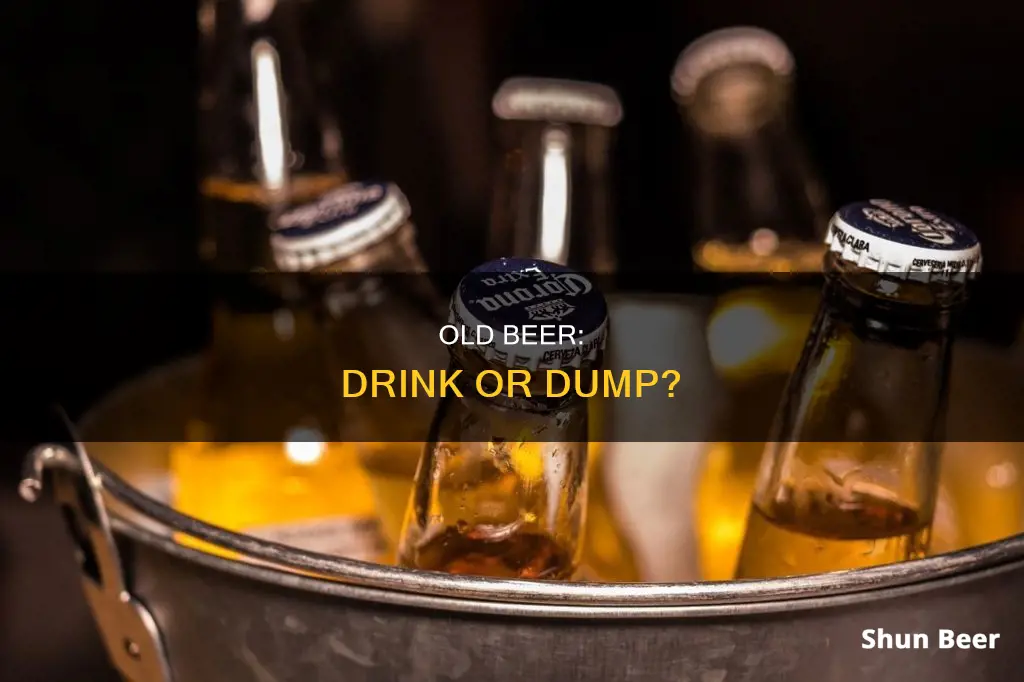
Drinking old beer is a topic that has been widely discussed on forums and by beer experts. The general consensus is that old beer will not make you sick, but it might taste bad. The fermentation process used in brewing, as well as the low pH level and alcohol content, make it difficult for microorganisms to grow in beer. However, the taste of beer changes over time due to oxidation and other factors, and old beer might acquire an unpleasant \skunky\ flavour. The shelf life of beer depends on various factors such as the type of beer, packaging, and storage conditions. Storing beer in a cool, dark place can help prolong its freshness.
| Characteristics | Values |
|---|---|
| Will old beer make you sick? | No, but it might taste bad. |
| Will old beer hurt you? | No, but it might not taste good. |
| Will old beer be yummy? | Depends on the type of beer, how it was stored, etc. |
| What causes beer to go bad? | Oxygen, heat, and light. |
| What does bad beer taste like? | Wet cardboard, overly sweet, or skunky. |
What You'll Learn

Is old beer harmful to drink?
Drinking old beer is not harmful to your health, but it may not taste very nice. The fermentation process used in brewing, as well as its low pH level and alcohol content, make beer an unfriendly environment for harmful microorganisms. However, over time, the taste of beer will change and it may become flat.
The four main factors that can cause beer to spoil are light, oxygen, heat, and time. Hops are sensitive to UV radiation from the sun, which is why most beer bottles are tinted brown. Even if exposed to sunlight for under an hour, beer will undergo a chemical reaction that produces 3-methyl crotyl mercaptan, a compound that exudes a distinct skunky flavour.
Oxidation also has a negative effect on beer. Oxygen interacts with the compounds from malt, yeast, and hops, causing oxidation and a disappointing papery taste. Heat speeds up oxidation, so it is recommended to store beer in a refrigerator. Major changes in temperature can also cause the beer to spoil.
Beers with higher ABV contents tend to have greater longevity. Bottle-conditioned beers with an ABV of 9% or higher will generally be fine if aged for over a year. Flavours will break down and organic compounds will continue to produce new reactions and nuances, which can actually improve the profile for many drinkers.
However, hoppy beers with lower ABVs tend to lose their flavour more quickly. IPAs, for example, are best enjoyed as fresh as possible. Even if purchased within two days of canning, an IPA will often taste "green", which can be tough on the palate and the digestive system. After a few months, an IPA's hop aromas will become muted.
In summary, old beer will not make you sick, but it may not taste very pleasant. The older the beer, the more likely it is that its flavour will have deteriorated.
Jaundice Recovery: Is Beer a Friend or Foe?
You may want to see also

How can you tell if old beer has gone bad?
Old beer won't make you sick, but it might taste bad. The fermentation process, low pH level, and alcohol content make beer an unfriendly environment for microorganisms. However, the taste of beer changes over time, and it can turn vinegary if bacteria gets in.
There are a few ways to tell if old beer has gone bad. Firstly, if it has lost its fizz, that's a sign that the seal was broken and the beer won't taste as it should. Secondly, if a non-tangy or non-acidic beer has a vinegary taste, that's a sure sign that bacteria has gotten in. Finally, if the beer has been left in the sun or exposed to UV light, it might have a skunky taste or smell.
Vegan-Friendly Cask Beer: What You Need to Know
You may want to see also

What factors cause old beer to taste bad?
Old beer is unlikely to make you sick, but it will probably taste bad. There are four main factors that can cause beer to spoil or "skunk": light, oxygen, heat, and time.
Light
Hops are sensitive to UV radiation from the sun, which is why most beer bottles are tinted brown. Even if exposed to sunlight for under an hour, beer will undergo a chemical reaction that produces 3-methyl crotyl mercaptan, a compound that exudes a distinct skunky flavour.
Oxygen
Oxidation is generally seen as having a negative effect on beer. No matter how well the beer is canned or bottled, there’s always a small amount of oxygen in each vessel. For most light styles, like pilsners, oxidation sets in rather quickly. Those bright, malty flavours are fragile and can quickly turn into acidic flavours of stewed tomatoes with a cardboard-like aftertaste.
Heat
High heat can make beer go stale. Storing your brews in a hot place, like a garage in summer, will affect your beer’s flavour. However, a bit of time at room temperature won’t hurt.
Time
With most hoppy beers, flavour tends to dwindle after the three- to six-month mark, due to the fragility of its fresh ingredients and the factors mentioned above. On the other hand, bottle-conditioned beers with an ABV of 9% or higher will generally be fine if aged for over a year.
The Fizziness in Beer: How Carbonation Works
You may want to see also

How should you store beer to prevent it from going bad?
Beer is best stored in a cool, dark place. The temperature and exposure to sunlight can impact the quality of the beer, so a cool, dark place like a basement or cellar is ideal. If you don't have access to a cellar or basement, a closet or under the bed are good alternatives.
The optimal temperature for storing beer is between 45 and 55 degrees Fahrenheit. If you don't have a way to measure the temperature, you can keep your unopened beer in the fridge, where it will remain at its best quality for up to eight months. You can also store unopened cans or bottles at room temperature, where they will stay at their best quality for up to six months.
It is important to store beer upright, rather than on its side. Storing beer upright minimises the amount of the beer's surface area that will be touching the air trapped in the bottle, reducing oxidation and slowing down the breakdown of the beer.
If you are storing beer in a keg, it is best to keep it in a cool, dry space, away from other foods. Avoid freezing the keg, as this will alter the taste of the beer. It is also important not to move the keg around too much, as this can increase the amount of foam that will spurt out when you tap the keg.
For opened bottles of beer, it is best to reseal them with an airtight cap or stopper to prevent oxidation and loss of carbonation. If you are storing an opened bottle in the fridge, it is best to store it upside down to prevent pressure from escaping.
Kicking the Beer Habit: Losing Weight and Gaining Health
You may want to see also

Which types of beer age well?
While most beers are brewed to be consumed soon after they're made, some beers can be aged for months or even years. Beers that tend to age well include:
- Lambics, gueuzes, and saisons: These are typically fermented with wild yeasts and bacteria found in and around the brewery. Lambics are usually aged in oak for one to two years, and gueuzes can be kept in barrels even longer. Their intricate yeast and microflora mean their aging can reveal unique, funky, and unpredictable notes over time.
- "Wild beers": Beers fermented with not only traditional yeast but certain microbes (lactobacillus, pediococcus, and brettanomyces) have a better chance of improving or evolving with age.
- "Strong beers": Beers with high alcohol content, such as barley wines, robust porters, and imperial stouts, tend to have more complex flavours and can develop new characteristics over time.
- Belgian ales: These can be left for a decade or so to see what happens.
- Bottle-conditioned beers with a high ABV: Beers with an ABV of 9% or higher will generally be fine if aged for over a year.
- Beers with relatively high hop bitterness: Beers that age well tend to have relatively high hop bitterness but are more malt forward than hop forward in their aromatics.
Non-Alcoholic Beer: A Safe Drink for Kidney Patients?
You may want to see also
Frequently asked questions
Yes, you can drink old beer. Beer doesn't expire in the same way that other foods and drinks do. The worst thing that will happen is that it will taste bad.
Drinking old beer will not make you sick or hurt you in any way. However, the taste of the beer will change over time.
If your beer has lost its fizz or has developed a vinegary taste, it's probably too old.







